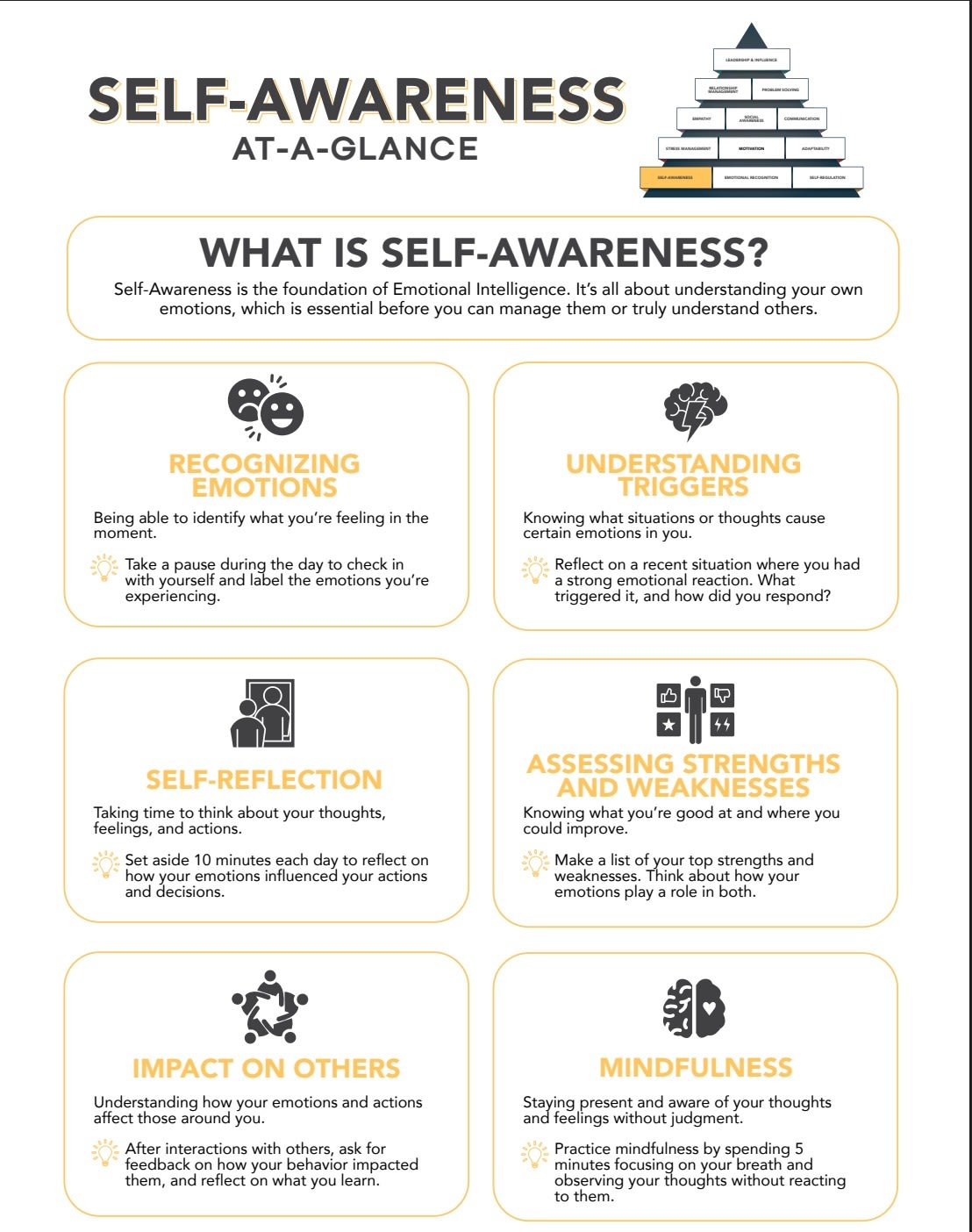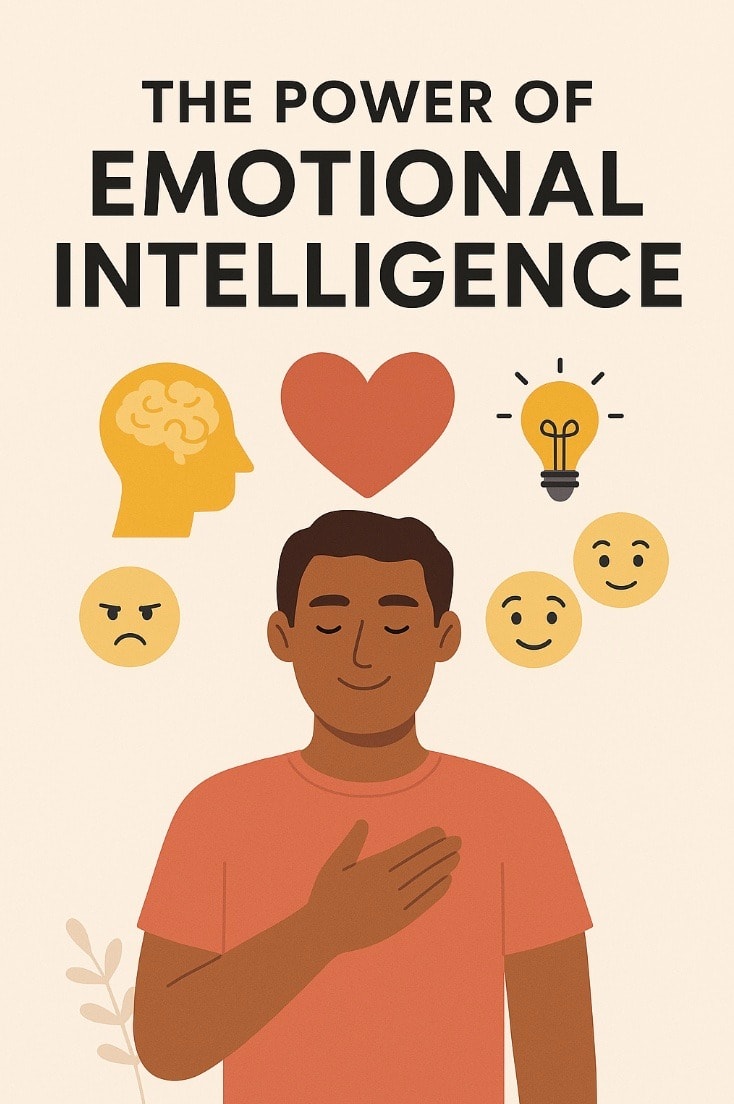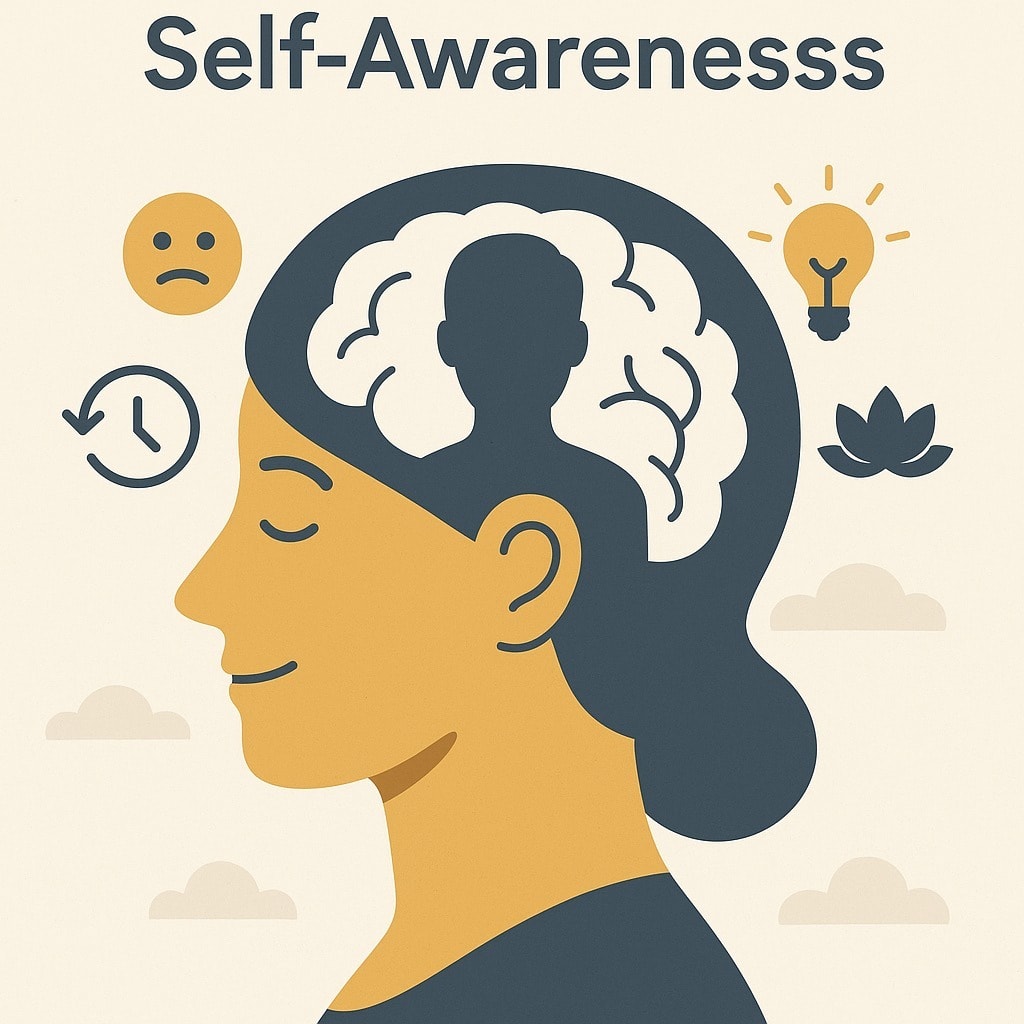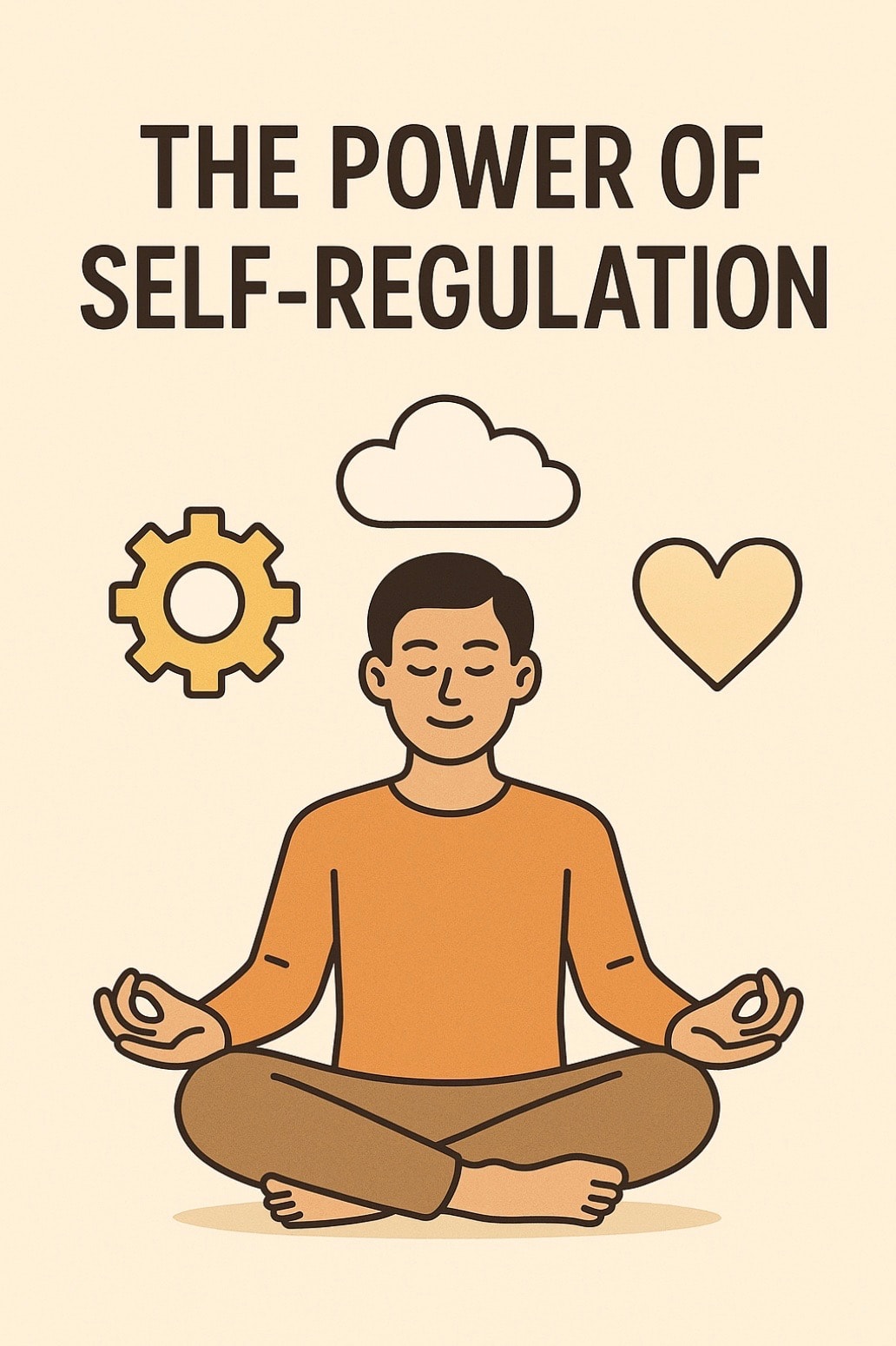In a world that constantly demands more of our attention, energy, and emotional bandwidth, the ability to regulate our internal experiences is no longer just a helpful trait—it's essential. Self-regulation is the cornerstone of emotional intelligence, enabling individuals to manage their emotions, thoughts, and actions in a way that promotes calm, control, and effectiveness, even in the face of adversity. This article explores self-regulation through six essential dimensions: Impulse Control, Emotional Resilience, Stress Management, Thoughtful Response, Adaptability, and Emotional Awareness in Decision-Making. Let’s dive into what self-regulation really is and how cultivating these six powerful habits can transform not only your emotional well-being but also your relationships, career, and overall quality of life.
The Power of Self-Awareness
The Power of Self-Awareness
The Power of Self-Awareness: A Foundational Guide to Emotional Intelligence
In a world driven by external validation, constant distractions, and emotional turbulence, developing self-awareness is not just a soft skill—it's a superpower. At the heart of emotional intelligence lies the ability to understand, recognize, and reflect on our own emotions. Before we can hope to manage our feelings or empathize with others, we must first master the art of self-awareness.
Self-awareness is the cornerstone of personal growth, mental wellness, and interpersonal effectiveness. This article explores the six pillars of self-awareness as illustrated in the infographic: Recognizing Emotions, Understanding Triggers, Self-Reflection, Assessing Strengths and Weaknesses, Impact on Others, and Mindfulness. Together, they form a powerful toolkit for living a more emotionally intelligent, grounded, and purpose-driven life.
What Is Self-Awareness?
At its core, self-awareness is the conscious knowledge of one’s own character, feelings, motives, and desires. It's a deep inner understanding of what makes you tick—why you react the way you do, what drives your behavior, and how your actions influence others.
Self-awareness is not a one-time achievement but a continual process of self-inquiry and reflection. By tuning into your internal world and understanding how it interacts with the external environment, you can navigate life more mindfully and meaningfully.
1. Recognizing Emotions: Naming the Feeling to Tame It
Being able to identify what you’re feeling in the moment is the foundation of self-awareness.
Far too often, we operate on emotional autopilot. We react without understanding what we’re actually feeling. We lash out, withdraw, or stress eat without taking a moment to ask: “What emotion am I experiencing right now?”
Practical Tip:
Pause and label. During your day, take a moment to pause and check in with yourself. Are you anxious? Excited? Irritated? Joyful? Naming your emotions helps reduce their intensity and gives you the power to choose your response rather than react impulsively.
Why It Matters:
* Increased emotional regulation. Recognizing your emotions helps you manage them constructively.
* Improved communication. When you can name what you're feeling, you can express yourself more clearly to others.
* Greater empathy. Understanding your emotions opens the door to understanding others.
2. Understanding Triggers: Know What Sets You Off
Knowing what situations or thoughts cause certain emotions in you is key to emotional mastery.
We all have emotional triggers—those events, people, or thoughts that elicit a strong emotional response. Some may stem from past trauma, unresolved conflict, or unmet needs. Identifying them is the first step to diffusing their power.
Reflective Practice:
Think about the last time you had a strong emotional reaction. What was the context? What specific thought or event triggered the feeling? How did you respond, and what would you do differently next time?
Examples of Common Triggers:
* Feeling ignored or dismissed
* Criticism from authority figures
* Rejection or abandonment
* Perceived injustice
* Being overwhelmed or under pressure
Benefits:
* Increased self-control during challenging moments.
* Reduced conflict in personal and professional relationships.
* Better problem-solving, as you learn to separate emotion from fact.
3. Self-Reflection: Turning the Mirror Inward
Taking time to think about your thoughts, feelings, and actions is an essential part of growth.
In our fast-paced world, self-reflection is a lost art. Yet it's during reflection that we extract meaning from our experiences. Without it, we risk repeating mistakes or falling into unhelpful behavioral patterns.
Daily Habit:
Set aside 10 minutes each day to reflect. Journal or simply sit in silence and ask:
* How did my emotions affect my decisions today?
* Did I act in alignment with my values?
* What could I have done better?
Outcomes of Regular Self-Reflection:
* Clarity on personal values and goals
* Insight into behavioral patterns and habits
* Growth in maturity, wisdom, and emotional resilience
4. Assessing Strengths and Weaknesses: An Honest Inventory
Knowing what you’re good at and where you can improve leads to empowerment and growth.
Self-awareness includes an accurate assessment of your capabilities. Too often, people either overestimate their strengths (leading to arrogance) or underestimate them (leading to insecurity). A balanced view allows you to maximize your potential and address areas that need development.
Action Step:
Make a list of your top 3 strengths and top 3 weaknesses. Reflect on how emotions influence both. For example:
* A strength like empathy may be enhanced by your ability to connect with others emotionally.
* A weakness like procrastination may be driven by underlying fear or self-doubt.
Why It Matters:
* Better decision-making in career and life choices
* Greater self-confidence, as you lean into your strengths
* Improved performance, by actively working on your weak areas
5. Impact on Others: Awareness of Emotional Ripples
Understanding how your emotions and actions affect those around you is key to emotional intelligence.
Our moods and behaviors are contagious. Whether we realize it or not, we are constantly influencing others—positively or negatively. Being mindful of this impact is a hallmark of emotionally intelligent people.
Simple Practice:
After an interaction, ask: How did I come across? Were you supportive or dismissive? Open or defensive? Consider asking for feedback from someone you trust, and genuinely listen to what they say.
Why It Matters:
* Stronger relationships based on empathy and mutual understanding
* Reduced misunderstandings, especially in conflict situations
* Better leadership, as you model emotional accountability
6. Mindfulness: The Present Moment as Your Power Source
Staying present and aware of your thoughts and feelings without judgment allows you to respond wisely.
Mindfulness isn’t just meditation—it’s a way of being. It means observing your inner experience without getting swept away. Rather than reacting to every thought or emotion, you acknowledge them and let them pass.
Start Small:
Practice mindful breathing for just 5 minutes a day. Focus on your breath going in and out. When your mind wanders (which it will), gently bring your attention back without self-judgment.
### Benefits of Mindfulness:
* Reduced stress and anxiety
* Improved concentration and clarity
* Greater emotional balance
Integrating Self-Awareness into Everyday Life
So, how can we practice these six elements of self-awareness consistently?
Morning Check-In
Start your day with a few minutes of mindful breathing. Ask yourself: “What am I feeling today?” and “What do I want to bring into the world today?”
Midday Pause
Set a reminder to check in around lunchtime. What emotions have surfaced so far? Have you been triggered? Have your actions aligned with your values?
Evening Reflection
Before bed, take 10 minutes to journal or mentally review your day. What did you learn about yourself? Where did you grow? Where can you do better tomorrow?
Why Self-Awareness Matters Now More Than Ever
In an age of digital distraction, emotional overload, and global uncertainty, self-awareness is a stabilizing force. It helps us stay rooted, clear-headed, and intentional. It fuels better leadership, deeper relationships, and a more meaningful life.
People who cultivate self-awareness:
* Navigate stress with more resilience
* Communicate more effectively
* Lead with authenticity and empathy
* Adapt more easily to change
* Build healthier habits and relationships
Final Thoughts: The Journey of a Lifetime
Self-awareness isn’t about being perfect or emotionally flawless. It’s about being honest, curious, and compassionate with yourself. It’s about peeling back the layers and choosing to grow.
By mastering the six components—Recognizing Emotions, Understanding Triggers, Self-Reflection, Assessing Strengths and Weaknesses, Impact on Others, and Mindfulness—you unlock a version of yourself that’s more grounded, empowered, and connected.
So take that pause. Ask the hard questions. Reflect deeply. And watch as your life transforms from the inside out.
“Knowing yourself is the beginning of all wisdom.” — Aristotle
Let this be your starting point. Because everything beautiful, brave, and brilliant you do in life begins with self-awareness.

We respect your privacy and will never share your information.
You can unsubscribe at any time with just one click - no hassle, no questions asked.
Tim is a graduate of Iowa State University and has a Mechanical Engineering degree. He spent 40 years in Corporate America before retiring and focusing on other endeavors. He is active with his loving wife and family, volunteering, keeping fit, running the West Egg businesses, and writing blogs and articles for the newspaper.
Leave a Comment 👋
Leave a Comment 👋
Leave a Comment 👋
Leave a Comment 👋

The Power of Emotional Recognition
In our fast-paced world filled with distractions, emotional recognition might seem like a luxury. But in reality, it is a foundational life skill—one that influences how we think, behave, relate, and communicate. When you can accurately identify and label emotions in yourself and others, you unlock doors to empathy, stronger relationships, better decision-making, and more effective communication. This article explores emotional recognition in depth—what it is, why it matters, and how you can cultivate it through six key practices: identifying your emotions, understanding triggers, recognizing emotions in others, differentiating similar feelings, expressing emotions clearly, and reflecting on emotional patterns. Each skill builds on the other, helping you develop a higher degree of emotional intelligence.

The Power of Self-Awareness
In a world driven by external validation, constant distractions, and emotional turbulence, developing self-awareness is not just a soft skill—it's a superpower. At the heart of emotional intelligence lies the ability to understand, recognize, and reflect on our own emotions. Before we can hope to manage our feelings or empathize with others, we must first master the art of self-awareness.
